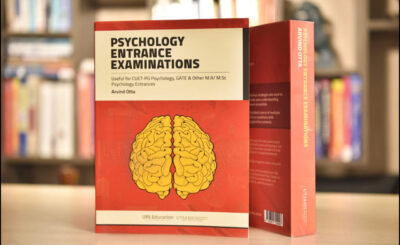![]()
GRE Psychology Question Papers | Exam Pattern | Sample Questions
The GRE is monitored and conducted by the Educational Testing Services (ETS) Twice or Thrice a Year. It is a standardized test, undertaken to fulfil the eligibility/entry requirement of the top universities abroad for admission in various undergraduate, Postgraduate, and PhD level courses.
If you are also planning to write the GRE Psychology Test, it becomes important to understand what GRE Psychology means, its exam pattern, and the type of questions asked. This article is a complete guide on the GRE Psychology exam pattern and syllabus, and you can also practice with sample questions of the GRE Psychology Exam given below.
What is GRE Psychology
At present, two types of GRE tests are conducted by ETS respectively GRE General and GRE Subject specific. GRE General test is for the student planning to go to graduate, business or law school. GRE generally aims to test the Verbal Reasoning, Quantitative Reasoning and Analytical Writing of an aspiring candidate.
The GRE Subject test is a specific test that measures your knowledge and skill level in a particular field of study. Psychology is one of the disciplines of GRE subject-specific tests. GRE Psychology score helps students gain admission into various postgraduate courses in Psychology at top universities worldwide.
Also Read: Benefits of GRE Psychology
GRE Psychology Examination pattern:
Mode of the Examination: Computer-Delivered
Type of Questions: MCQ (Multiple Choice Questions)
Total Number of Questions: 144
Number of Available Options: 05 (A, B, C, D and E)
Duration of the Test: 2 Hours
GRE Psychology Syllabus
The GRE Psychology syllabus is divided into 6 major sub-branches of Psychology as given below
1. Biological (30 questions)
A. Sensation and Perception (9-11 questions)
- Psychophysics, Signal Detection
- Attention
- Perceptual Organization
- Vision
- Audition
- Gustation
- Olfaction
- Somatosenses
- Vestibular and Kinesthetic Senses
- Theories, Applications and Issues
B. Physiological/Behavioral Neuroscience (19-21 questions)
- Neurons
- Sensory Structures and Processes
- Motor Structures and Functions
- Central Structures and Processes
- Motivation, Arousal, Emotion
- Cognitive Neuroscience
- Neuromodulators and Drugs
- Hormonal Factors
- Comparative and Ethology
- States of Consciousness
- Theories, Applications and Issues
2. Cognitive (29 Questions)
A. Learning (6-8 Questions)
- Classical Conditioning
- Instrumental Conditioning
- Observational Learning, Modeling
- Theories, Applications and Issues
B. Language (4-6 questions)
- Units (phonemes, morphemes, phrases)
- Syntax
- Meaning
- Speech Perception and Processing
- Reading Processes
- Verbal and Nonverbal Communication
- Bilingualism
- Theories, Applications and Issues
C. Memory (10-12 questions)
- Working Memory
- Long-term Memory
- Types of Memory
- Memory Systems and Processes
- Theories, Applications and Issues
D. Thinking (5-7 questions)
- Representation (Categorization, Imagery, Schemas, Scripts)
- Problem-Solving
- Judgment and Decision-Making Processes
- Planning, Metacognition
- Intelligence
- Theories, Applications and Issues
3. Social (19 questions)
- Social Perception, Cognition, Attribution, Beliefs
- Attitudes and Behavior
- Social Comparison, Self
- Emotion, Affect, and Motivation
- Conformity, Influence, and Persuasion
- Interpersonal Attraction and Close Relationships
- Group and Intergroup Processes
- Cultural or Gender Influences
- Evolutionary Psychology, Altruism and Aggression
- Theories, Applications and Issues
4. Developmental (18 questions)
- Nature-Nurture
- Physical and Motor
- Perception and Cognition
- Language
- Learning, Intelligence
- Social, Personality
- Emotion
- Socialization, Family and Cultural
- Theories, Applications and Issues
5. Clinical (23 questions)
A. Personality (4-6 questions)
- Theories
- Structure
- Assessment
- Personality and Behavior
- Applications and Issues
B. Clinical and Abnormal (17-19 questions)
- Stress, Conflict, Coping
- Diagnostic Systems
- Assessment
- Causes and Development of Disorders
- Neurophysiological Factors
- Treatment of Disorders
- Epidemiology
- Prevention
- Health Psychology
- Cultural or Gender Issues
- Theories, Applications and Issues
6. Measurement, Methodology and Other (25 Questions)
A. General (7-9 questions)
- History
- Industrial-Organizational
- Educational
B. Measurement and Methodology (16-18 questions)
- Psychometrics, Test Construction, Reliability, Validity
- Research Designs
- Statistical Procedures
- Scientific Method and the Evaluation of Evidence
- Ethics and Legal Issues
- Analysis and Interpretation of Findings
Sample Questions for GRE Psychology
Here are some sample questions for the GRE Psychology
Q. Organizing the string of letters B-F-J-T-A-V-K-C into JFK-TV-CAB is an example of
(A) simplifying
(B) clustering
(C) seriating
(D) chunking
(E) paraphrasing
Q. When persuasive communications follow the peripheral route, they focus on which of the following?
(A) Beliefs
(B) Facts
(C) Values
(D) Emotions
(E) Cognitions
Q. Which of the following is chemically similar to opiates, has the ability to reduce pain, and is blocked by the action of naloxone?
(A) Norepinephrine
(B) Acetylcholine
(C) Serotonin
(D) Endorphin
(E) Dopamine
A full-length GRE Psychology test paper is given below:
Prepare for the GRE Psychology Test with India’s leading Psychology Entrance Institute. Click Here to Enroll!
List of Government Institutes for MPhil Clinical Psychology – Click here!









